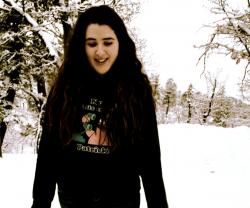Song of Winter
Folder:
The Wanderer The tears that beat my drum fall on obtuse ears of the numb
To be tossed like the toppling frost on the pane of jostling
Coaxed by the strum of biting chill woods to feel a thrill from
Stumbling on the mottling snow with bumbling habits blossoming
Notes flow down to wear the crisp gale sewn from air frigid and frail
The dying sun dwindles and pales denying another day to prevail

Textbook example
This poem should be in a "how to" textbook for beginning poets. The enormous control of the phonetic sounds is more impressive than I have words to describe; it is not merely a poem, but an orchestration of sound. When English was less Latin, and more Celtic, the ancient bards (no, I don't mean Shakespeare) wrote like that. John Milton, the most Latinate of English poets, could not have pulled off this poem, or any like it. You should be very proud of this poem, and of the verbal mastery to which it bears an obvious and sincere witness.
Starward*Led
^_^ you are much too kind,
^_^ you are much too kind, but boy, do I appreciate it! I have an obsession with John Milton, so I cannot believe what I'm seeing! ^_^ I'm so flattered!
Thanks for the reply.
I started reading poetry in 1973, when forced to in school; but then I chose to read poetry in Autumn, 1975, starting with Milton. I found him much to Latinate and much too self righteous (i.e., the characterization of Eve in P.L.). The best poets I have found, truly, are the Welsh---especially those they call the bards (again, nothing to do with Shakepeare). Since the early 1800's, they have had annual poetry contests, called eisteddfod (which means "sitting together") in which poets compete for chairs and crowns. They also use pseudonyms for their poems, a tradition that frees me from my mundane name. Although I cannot read or speak their language, you can get an idea of their great love of poetry from looking at photographs or reading what little in English has been written about them. If you go on You Tube and look up the film, Hedd Wyn, it is a very beautifully photographed movie about a young Welsh poet who won the chair posthumously after being killed needlessly on Flanders Field during WWI. The Welsh were compelled to serve in that war by the British government . . .well, I won't open that can of worms here. Another way to get at the Welsh environment (to see what their poetry springs from) is to go on You Tube and look up Welsh Steam or Welsh Railroads. They have a lot of narrow guage railroads that operate as nostalgic amusements now, but they travel through a countryside that, in my opinion, is as close to the Garden of Eden (no matter how Uncle John describes it) as can be gotten on this earth.
Starward*Led
Hmm that's so interesting. I
Hmm that's so interesting. I definitely will! My english teacher went to school for his PhD in Wales. He was in love with the culture and writers that it produced. Unfortunately, he did not mention much about it. However, he did commonly bring up one writer in particular whom he greatly admired and befriended, Leslie Norris. I've read several of his works, but that is pretty much the extent of my experience with Welsh poetry. x)
Great flow!
This poem flows naturally and well written with lots of imagery. Definitely a modern day poem!
Thank you very much! :)...
Thank you very much! :)... I've just been reading some of your stuff.... a bit dark... i really enjoy it!
"...from air frigid and frail..."
I'm back again in Anne of Green Gable's field feeling a prayer . . . this is how words should work emotions, whip emotions into a frenzy of articulation and receptivity. Lovely cadence, exquisite syntax, poetry from the mind of the poet to the lover of poetry's hearing- nice. ~Lady A~
Thank you so much for your
Thank you so, so much for your encouraging comments!!! :)
Something New?
or some old poems posted would give us something to read while you compose. Miss you. - :S
Aw, thank you! I have one old
Aw, thank you! I have one old thing I wanted to redo soon, and I'm trying to get some motivation/inspiration to do something resembling a mini epic... ehhh I just haven't found the wind for it though. ^_^
Am Epyllion? Excellent!
Am Epyllion? Excellent! That is how I started writing poetry back in October 1975, although mine failed miserably (I was not as talented, then, as you are now). Have you read Alexander Pope's satryical epyllion, The Rape of the Lock? That's a must-read for any young poet contemplating the epic/epyllion form. It is short, swift, has all the epic machinery, and is a good length for an epyllion.
Starward*Led